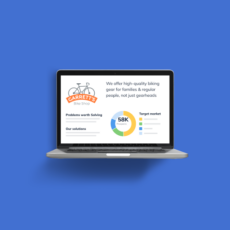Kody Wirth is a content writer and SEO specialist for Palo Alto Software—the creator's of Bplans and LivePlan. He has 3+ years experience covering small business topics and runs a part-time content writing service in his spare time.
What to Do Before Starting a Business

5 min. read
Updated April 19, 2024
When you’re fired up about starting a business, it can be tempting to jump right in. But before you start picking out the perfect business name and researching ideas—you need to understand what you’re getting into.
Business ownership isn’t glamorous or easy. It’s challenging and sometimes overwhelming. But it can be incredibly exciting and fulfilling when you take the time to do it right.
That means your first step should be understanding why you’re starting and what it will take to succeed. This guide will walk you through different ways to accomplish this and help you prepare to become a business owner.
Do some self-reflection
At the start, it’s likely just you building the business. You need to know why you want to come in day after day. You need to understand your limitations. And ideally, have a support network to talk to.
So, before you start coming up with the perfect business idea—look inward and have answers to the following questions.
1. Why are you starting a business?
There are likely many reasons why you want to become an entrepreneur. Maybe you want to be your own boss, create a legacy for your kids, or are driven by a powerful mission. Just be sure you know why before opening.
Dig Deeper: 30 compelling reasons to start a business
2. What are your strengths and weaknesses?
As an entrepreneur, you will be involved with every aspect of your business. That doesn’t mean you’ll be good at everything. To avoid costly issues—understand your strengths and limitations to bypass the latter.
Dig Deeper: How to identify your strengths and weaknesses
3. Have you considered the pros and cons of running a business?
Many positives are associated with being your own boss—after all, you’re in control. Just remember that control comes with many responsibilities and challenges to manage.
Dig Deeper: The pros and cons of being your own boss
Brought to you by
Create a professional business plan
Using AI and step-by-step instructions
Create Your PlanSecure funding
Validate ideas
Build a strategy
4. Have you sought advice from the right people?
Don’t start a business in an echo chamber. Connect with people you trust to discuss your aspirations, ideas, and hopefully get continued support. If you’re unsure who to talk to, here are our recommendations.
Dig Deeper: 5 people you should talk with before starting a business
5. Can you answer critical startup questions?
SCORE (Counselors to America’s Small Business) is a nonprofit association that guides and supports business owners. They recommend answering a series of questions that span general entrepreneurship knowledge as well as how you would approach completing specific startup steps.
Dig Deeper: Top 15 startup questions before starting a business
Get to know entrepreneurship
Are you ready to start a business? Do you understand what traits or skills lead to success? Do you know what pitfalls to avoid?
If you answered no or maybe to any of these questions, check out the following resources to familiarize yourself with business ownership.
Now you need a good idea
After some self-reflection and exploration of what it takes to be an entrepreneur, you have a decision to make.
Do you still want to start a business?
If you answer yes, you’ll need a solid idea to move forward with. Check out the next step in our startup guide to finalize your idea and then move on to validating if people are interested in it.
Startup resources and templates
Having the right tools and resources can be critical to starting a business. Here are some of our favorites worth checking out before you officially start.











